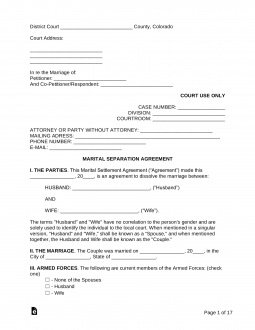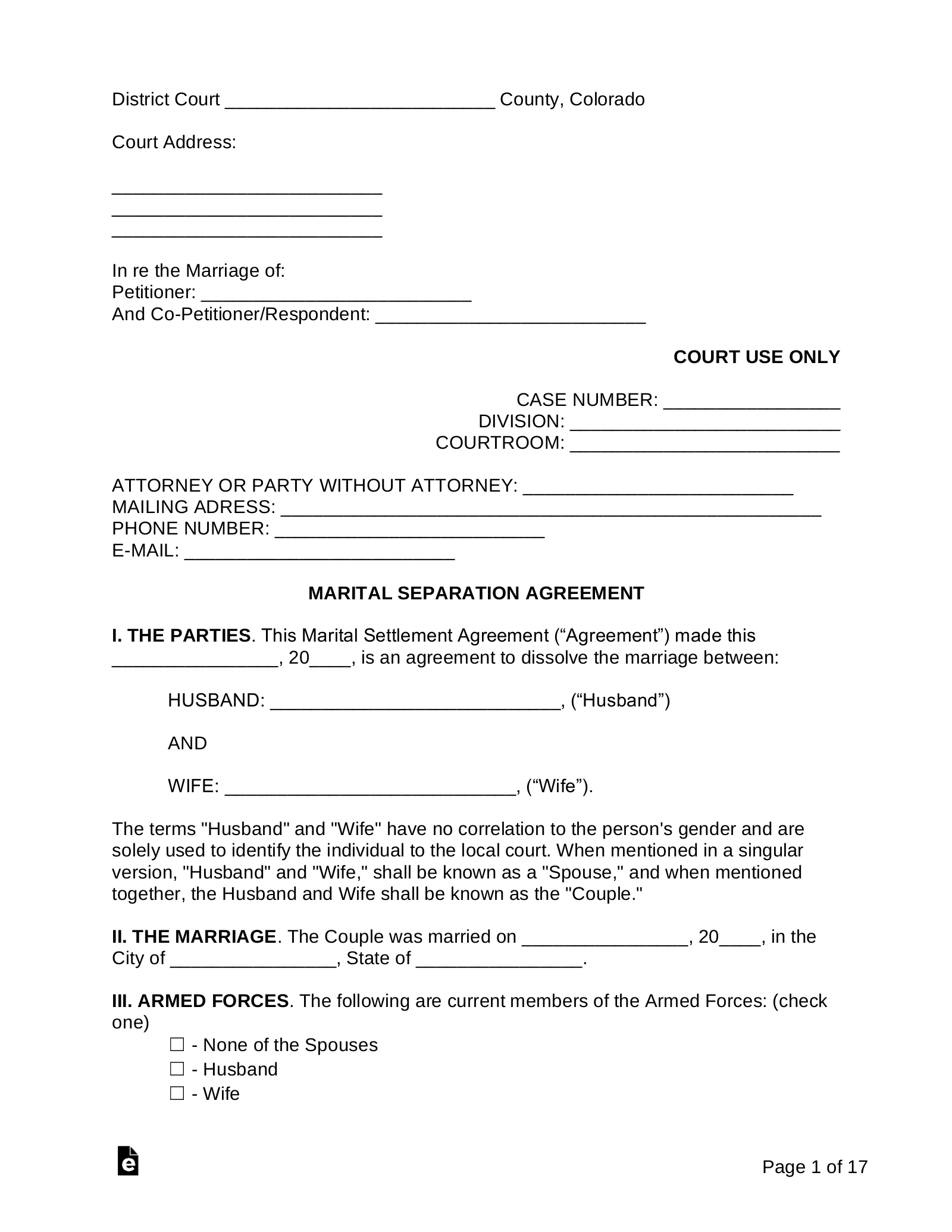Updated February 08, 2024
A Colorado marital settlement agreement is a legal document that spouses draft to define the terms of their divorce. Matters typically discussed in a settlement agreement include spousal support (alimony), child support, parental rights, and the disposition of shared property and debt. Before imposing any financial stipulations, each party must provide the other with a financial statement that identifies their assets, income, debts, and tax information. Establishing these terms in advance will streamline the divorce proceedings and reduce the possibility of court intervention. With no agreement in place, the couple cannot control the outcome of their property, and the court will ultimately determine the amounts for alimony and child support.
Table of Contents |
Divorce Laws
Statutes – Title 14, Article 10 (Uniform Dissolution of Marriage Act)
Alimony (§ 14-10-114(3)(a)(I)) – The factors that determine the amount and term of alimony include, but are not limited to, the following:
- All potential and actual sources of finance of the receiving spouse and their ability to meet their needs independently;
- All potential and actual sources of finance of the paying spouse and their ability to meet their needs while paying alimony;
- The lifestyle established while married;
- Marital property distribution, including additional marital property that may be awarded to relieve the need for alimony;
- The spouses’ income, employment, and employability, all of which could be obtained through due diligence and education or training (if necessary), and the necessary reductions in their employment due to the needs of their children or other circumstances;
- Whether the income of a spouse is historically different from the income reflected at the time alimony is awarded, and the length and consistency of overtime income and other employment;
- How long the marriage lasted;
- The amount and duration of temporary alimony paid to the receiving spouse;
- The spouses’ age and health, with consideration of significant health care needs or unreimbursed or uninsured health care costs;
- A spouse’s contributions to the marriage or to the advancement of the other spouse’s education, occupation, or ability to earn money;
- Payment of the other spouse’s debts, or enhancements of the other spouse’s property;
- Whether the conditions of the spouses at the time permanent alimony is awarded warrants the issuance of a nominal amount of alimony to maintain a claim for alimony in the future;
- Whether the alimony can be deducted on the payor’s federal income tax and whether the amount is taxable income to the receiving spouse, and the adjustments of the alimony to fairly allocate the tax hardship between the spouses; and
- All other factors deemed relevant by the court.
Child Support (§ 14-10-117) – Colorado courts follow these guidelines to determine a spouse’s basic child support obligations and any adjustments for related expenses (e.g., medical bills, childcare).
Child Support Calculator – courts.state.co.us
Division of Property (§ 14-10-113) – Equitable distribution is used in Colorado courts when dividing marital property. This means that assets and debts won’t be split evenly, but will instead be distributed fairly between the spouses.
Grounds for Divorce (§ 14-10-106 & § 14-10-110) – A divorce may only be granted if the court finds that the marriage is irretrievably broken.
Interim Support (§ 14-10-108) – During the pendency period for divorce, either spouse may motion the court to award an order for temporary alimony, child support, debt payment, parental obligations, and the use of property.
Residency (§ 14-10-106(1)(a)(I)) – Either spouse must live in Colorado for ninety-one (91) days immediately preceding the filing of the divorce complaint.
Divorce Forms
- Where to File – District Court
- Filing Fee – $230
- How Long Does it Take? Six (6) to nine (9) months (source: colorado-family-law.com)
Uncontested Divorce with No Children:
-
- Affidavit for Decree Without Appearance of Parties (JDF 1018)
- Case Management Order (not available online)
- Certificate of Compliance with Mandatory Financial Disclosures (JDF 1104)
- Decree of Dissolution of Marriage or Legal Separation (JDF 1019)
- Domestic Case Information Sheet (JDF 1000)
- Final Decree (not available online)
- Finding and Order Concerning Payment of Fees (JDF 206)
- Motion to File Without Payment and Supporting Financial Affidavit (JDF 205)
- Notice of Domestic Relations Status Conference (JDF 1121)
- Notice of Hearing (JDF 1124)
- Notice to Set Hearing (JDF 1123)
- Petition for Dissolution of Marriage or Legal Separation (JDF 1011)
- Response to the Petition for Dissolution of Marriage or Legal Separation (JDF 1015)
- Separation Agreement (Marriage) (JDF 1115)
- Sworn Financial Statement (JDF 1111SC)
- Sworn Financial Statement, Supporting Schedules (JDF 1111SS)
- Waiver and Acceptance of Service (JDF 1222(a))
Uncontested Divorce With Children:
- Case Management Order (not available online)
- Certificate of Compliance with Mandatory Financial Disclosures (JDF 1104)
- Decree of Dissolution of Marriage or Legal Separation (JDF 1019)
- Domestic Case Information Sheet (JDF 1000)
- Final Decree (not available online)
- Finding and Order Concerning Payment of Fees (JDF 206)
- Motion to File Without Payment and Supporting Financial Affidavit (JDF 205)
- Notice of Domestic Relations Status Conference (JDF 1121)
- Notice of Hearing (JDF 1124)
- Notice to Set Hearing (JDF 1123)
- Parenting Plan (1113)
- Petition for Dissolution of Marriage or Legal Separation (JDF 1011)
- Response to the Petition for Dissolution of Marriage or Legal Separation (JDF 1015)
- Separation Agreement (Marriage) (JDF 1115)
- Support Order (JDF 1117)
- Sworn Financial Statement (JDF 1111SC)
- Sworn Financial Statement, Supporting Schedules (JDF 1111SS)
- Waiver and Acceptance of Service (JDF 1222(a))
The case will be viewed as uncontested by the court if the spouses agree on the terms of their separation and file a joint petition. When filling out the divorce paperwork, one spouse is identified as the “petitioner” while the other is the “co-petitioner.”
How to File for Divorce in Colorado (7 steps)
- Complete Initial Documents
- File Divorce Papers
- Response from Co-Petitioner
- Additional Documents
- Set Court Hearing or Status Conference
- Court Hearing or Status Conference
- Change Name
1. Complete Initial Documents

To start the filing process for divorce, both parties must complete a Petition for Dissolution of Marriage or Legal Separation. If either party wishes to restore their former name after divorce, this request must be indicated in the appropriate area of the petition. One of the parties must also complete a Domestic Case Information Sheet. These documents and all other court forms should be photocopied.
2. File Divorce Papers

The divorce papers must be taken to a local District Court and filed with a clerk. The clerk will charge the filer a fee of $230. If unable to afford the fee, an exemption can be requested by filing a Motion to File Without Payment and Supporting Financial Affidavit along with a blank Finding and Order Concerning Payment of Fees. The couple will be required to attend an Initial Status Conference (ISC) which is a preliminary meeting where the parties can explain any issues concerning their case. If an ISC wasn’t scheduled automatically, the filer will need to contact a clerk and schedule the date themselves. The clerk may also provide the filer with a Case Management Order containing important information about the divorce case.
3. Response from Co-Petitioner

The co-petitioner may respond to the divorce petition by filing a Response to the Petition for Dissolution of Marriage or Legal Separation. In this document, the co-petitioner states whether they agree or disagree with the petitioner’s claims. It should be noted that the parties must agree on all divorce-related matters in order to obtain an uncontested divorce judgment. If a response is filed, the co-petitioner must pay a $116 fee and mail a copy of their response to the petitioner.
- In many divorce cases, the court requires the petitioner to notify their spouse of the divorce case by serving them with copies of the filed paperwork. However, since the spouses filed a joint petition, service of the paperwork is not required.
4. Additional Documents

Additional paperwork must be completed by the parties and filed with the court within forty-two (42) days after the divorce papers were initially filed. The additional documents are as follows:
- Financial Disclosures
- Each party must complete a Sworn Financial Statement to reveal their current income, assets, expenses, and debts. If needed, additional assets and property may be reported in a Sworn Financial Statement, Supporting Schedules. The spouses should provide each other with copies of their statements.
- Certificate of Compliance with Mandatory Financial Disclosures
- After the parties disclose their finances, each spouse must complete a Certificate of Compliance with Mandatory Financial Disclosures. A copy of the certificate must be delivered to the other spouse before filing with the court.
- Parenting Documents
- If the divorce involves minor children, the spouses must complete a Parenting Plan to allocate parental responsibilities and establish a custody schedule. They must also calculate child support obligations by completing a Child Support Worksheet (see instructions).
- Separation Agreement
- A Separation Agreement is needed to describe how the parties intend to handle alimony, child support, and the disposition of assets and debts. It also proves to the court that the couple has resolved all matters regarding their separation.
- Support Order
- If either spouse requests alimony or child support, they must prepare a Support Order. Only the caption and party/children information should be filled in; the remainder of the form will be completed by a judge or magistrate.
- Decree of Dissolution of Marriage or Legal Separation
- Either spouse must prepare a Decree of Dissolution of Marriage or Legal Separation by filling in the caption area and other sections that apply to their case. If a name change has been requested, the requesting party should provide the court with an additional copy to be certified ($20 fee per certified copy).
- Affidavit for Decree without Appearance of Parties
- If the parties do not have children, they may file an Affidavit for Decree Without Appearance of Parties to notify the court that they are eligible to proceed without appearing in court.
5. Set Court Hearing or Status Conference

If the parties received a Case Management Order with information about scheduling a hearing or status conference, the procedures described in the order must be followed. If the court scheduled a status conference, but neither party appeared in court, the parties must only complete the 3rd step below. Otherwise, the parties must complete all three (3) of the following steps to set a date and time for their court appearances:
- Either party must fill out a Notice to Set Hearing, deliver a copy to their spouse, and file the original document with the court.
- The spouse who filed the Notice to Set Hearing must contact a clerk of the court and ask them to schedule a date for their hearing or status conference.
- If a hearing or status conference is deemed necessary by the court, the spouse will need to complete either a Notice of Hearing or Notice of Domestic Relations Status Conference. A copy must be delivered to the other spouse, and the original must be filed with the court.
Note: If the parties filed an Affidavit for Decree Without Appearance of Parties, they may not be required to appear in court. The couple should contact a clerk to determine whether their presence in court is required.
6. Court Hearing or Status Conference

The parties should contact the District Court to see if both spouses need to appear in court. The non-attending parties should provide the court with a self-addressed and stamped envelope to receive their Decree/Order by mail. Those who are required to attend the hearing or status conference must visit the courthouse on the designated date and present their case to the judge or magistrate. The case will be evaluated and the judge or magistrate will decide whether the divorce should be granted. If a divorce is awarded, the parties will receive a copy of the Final Decree and Support Order to notify them that their marriage has been terminated.
7. Change Name

Individuals who requested a name change must request a certified copy of their Final Decree from the court (there will be a $20 fee). They may then present the decree to the Social Security Administration, DMV, and other institutions to update their records.


